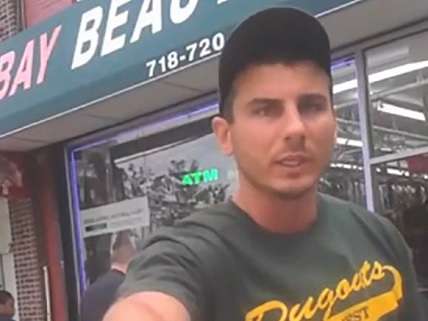Cop Who Put Eric Garner in Fatal Chokehold Has History of Substantiated Abuse Allegations Against Him
He is still employed by the NYPD.

Documents obtained by ThinkProgress reveal that Daniel Pantaleo, the NYPD officer who put Eric Garner in a fatal chokehold after engaging him over the alleged sale of loose, untaxed cigarettes, had seven disciplinary complaints consisting of 14 individual allegations lodged against him, four of which, from two complaints, had been substantiated by the Citizens Complaint Review Board (CCRB), which, according to ThinkProgress, had recommended disciplinary action against the cop.
The four substantiated allegations of abuse of authority yielded three penalties from the NYPD, and one ruling that rejected the CCRB's conclusion. The allegations came from two incidents, a vehicle search in in December 2011 and a stop & frisk in June 2012. The CCRB recommended the harshest penalty available to it for each of the allegations—administrative prosecution by the NYPD. The process can end in termination. Instead, the NYPD's Administrative Prosecution Unit found Pantaleo not guilty on one of the abuse charges stemming from the June 2012 incident, and guilty on the other, penalizing him two vacation days. The NYPD rejected the CCRB's recommendation in the December 11 incident, going with the weakest penalty instead, mandatory training.
Unsubstantiated allegations, according to ThinkProgress, included "allegations that Pantaleo refused to seek medical treatment for someone in 2009, hit someone against an inanimate object in 2011, made abusive vehicular stops and searches on two separate occasions in 2012, and used physical force during another incident in 2013." Experts ThinkProgress spoke to said that the number of allegations against Pantaleo should have raised "red flags" with the NYPD. But given the extensive protections granted cops through their union contracts as well as local and state laws, there is not much incentive for the NYPD to pursue problematic cops. CCRB data, according to ThinkProgress, shows that fewer than 5 percent of NYPD officers have more than seven complaints against them like Pantaleo, and just 2 percent (738 cops) have more than one complaint with substantiated allegations.
The New York Civil Liberties Union told ThinkProgress that the city's decision in 2014 to stop releasing officers' complaint histories to attorneys and reporters who requested them illustrated that Mayor Bill de Blasio "has not been good on police transparency." A spokesperson for the mayor disputed that, but neither the NYPD nor the New York City Law Department, which represents the NYPD, officers who are sued, as well as the CCRB, responded to ThinkProgress' requests for comment.
Samuel Walker, a criminal justice emeritus professor at the University of Nebraska, noted to Think Progress that New York City has a lot of influence on police departments across America. "With the largest police force in the country and a robust local media presence, the NYPD can impact how officers and unions operate elsewhere," ThinkProgress paraphrases Walker as saying. But substantive police reforms in New York will require political leaders who, unlike de Blasio, are actually committed to reform and not just to re-election, and who are not ideologically sympathetic to the unions that helped produce the rules that protect bad actors.


Show Comments (12)